Board Games: Games Dan (the board game snob) doesn't like ...
Dan likes board games as opposed to party games so you'll never find him playing games like Balderdash, Cranium, Articulate or Pictionary (all of which I love!) We both share a loathing of Monopoly but I do love games like Pictionary - I have very fond memories of playing bilingual Pictionary in Hong Kong and Beijing. Anyway, here's a list of board games that are very borderline for Dan. They're board games, but he thinks they're borderline party games. I like them, though!
Concept
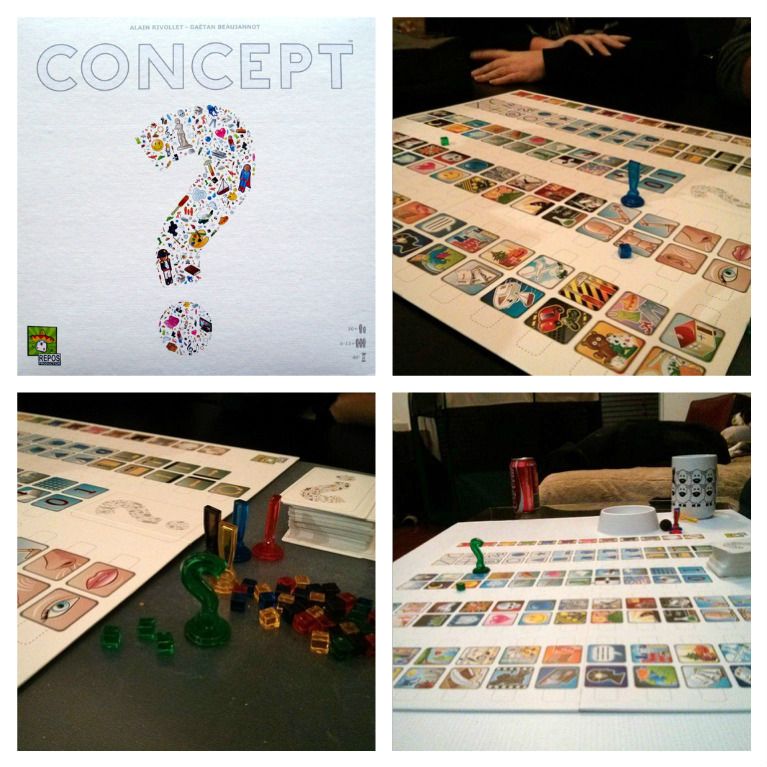
Blurb: In Concept, your goal is to guess words through the association of icons. A team of two players - neighbors at the table - choose a word or phrase that the other players need to guess. Acting together, this team places pieces judiciously on the available icons on the game board.
To get others to guess "milk", for example, the team might place the question mark icon (which signifies the main concept) on the liquid icon, then cubes of this color on the icons for "food/drink" and "white". For a more complicated concept, such as "Leonardo DiCaprio", the team can use the main concept and its matching cubes to clue players into the hidden phrase being an actor or director, while then using sub-concept icons and their matching cubes to gives clues to particular movies in which DiCaprio starred, such as Titanic or Inception.
The first player to discover the word or phrase receives 2 victory points, the team receives points as well, and the player who ends up with the most points wins.
My Thoughts: It's basically like charades but much more cerebral than that. The interesting thing is that unlike most board games, you don't have hard and fast rules. So long as you don't use words or gestures to help people along, the game pretty much allows you to use the board, graphics and tokens in any way you like to try to help people guess your meaning.
Kill Doctor Lucky
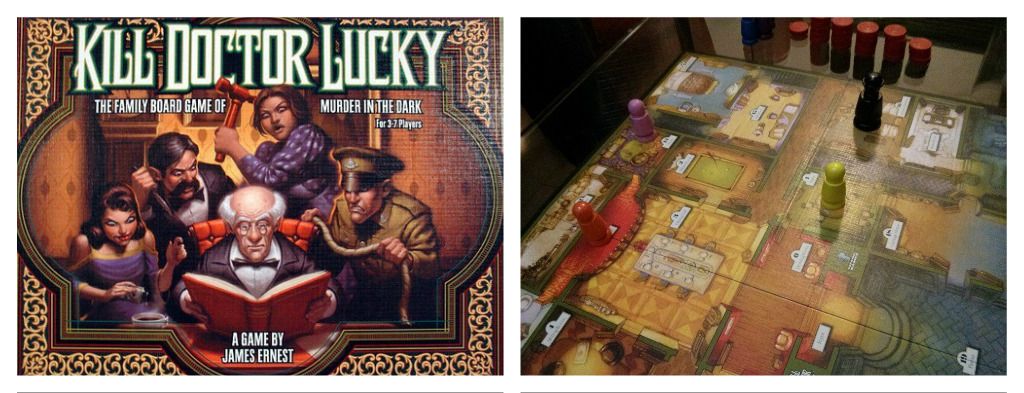
Blurb: In this notorious game, an inversion of Clue, you hate Doctor Lucky. Maybe he left you out of his will. Maybe he killed your pet rock. Whatever the reason, you want him dead. Unfortunately, so do the other players. Since you don't want to go to jail, you need to make your attempt in secret; if anybody can see you, whistle nonchalantly, and let the Doctor live ... until next time.
Players move around the mansion, collecting murder weapons (to make the murder attempt stronger - doubly so if the weapon is used in an appropriate location); failure cards (to thwart opponents' plans); and movement cards (to try to get together with Doctor Lucky in a secluded location for his inevitable demise.) Players try to convince others to use up their failure cards first, the better for when their own attempts come.
My Thoughts: I've never much liked Clue (or Cluedo as it is called sometimes) but I really enjoyed this game. Dr Lucky is ever-out of your reach and players compete against one another to kill Dr Lucky - but you can't do it unless you are alone and no other player can see you (the rooms have doorways). You also need to have enough spite points to kill him. There are a number of different complexities in play and it's competitive but in a fun way.
Escape: The Curse of the Temple
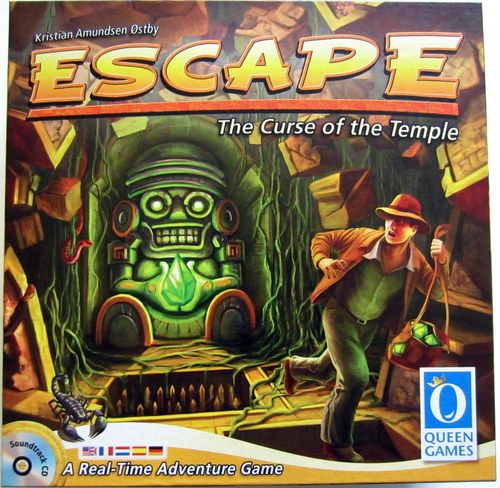
Blurb: Escape: The Curse of the Temple is a cooperative game in which players must escape (yes...) from a temple (yes...) which is cursed (yes...) before the temple collapses and kills one or more explorers, thereby causing everyone to lose.
The initial game board consists of a row of three square tiles, each showing a combination of two symbols, say, two green adventurers or one green adventurer and one blue key in one corner of the tile. All of the explorers start in the center tile - the safe room - and each player starts with a hand of five dice. Each die has five symbols:
A cursed mask - this die is set aside when rolled.
A golden mask - each such symbol counteracts two cursed masks, either your own or those of another explorer in the same room.
A red torch or blue key - these are used to enter rooms, access treasure, or activate gems.
A green adventurer, which appears twice on the die - you need these to move from room to room, and to activate some gems.
Escape is played in real-time, with all players rolling dice and taking actions simultaneously. You must roll the right symbols to enter a room, and if you're at an open doorway, you can roll to reveal the next tile in the stack and add it to that doorway. Some rooms contain combinations of red and blue symbols, and if you (possibly working with other players in the same room) roll enough red or blue symbols, you "discover" magic gems, moving them from a separate gem depot onto that tile.
The real-time aspect is enforced by a soundtrack to be played during the game. At certain points, a countdown starts, and if players aren't back in the safe room when time is up, they lose one of their dice.
Once the exit tile is revealed, players can attempt to escape the temple by moving to that tile, then rolling a number of blue dice equal to the magic gems that haven't been removed from the gem depot. Thus, the more gems you find, the easier it is to escape the temple. When a player escapes, he gives one die to a player of his choice. If all players escape before the third countdown, everyone wins; if not, everyone loses, no matter how many players did escape.
Escape: The Curse of the Temple includes two expansion modules that can be used individually or together. With the "Treasures" module, some rooms contain treasure, and when you reveal such a room, you place a face-down treasure chest on the tile. Roll the symbols on that chest tile, and you claim the treasure for use later: a key lets you teleport anywhere, a path lets you connect two rooms that otherwise have no door between them, and a medic kit heals all players instantly (putting black dice back into play). With the "Curses" module, some tiles "curse" players by forcing them to place one hand on their head, keep mute during play, or otherwise do what you wouldn't want to do while escaping a temple!
My Thoughts: Dan hates this game because he likes turn based strategy games and not games where you are racing against the clock. I think there are so many fun elements to it though.
Escape: Zombie City
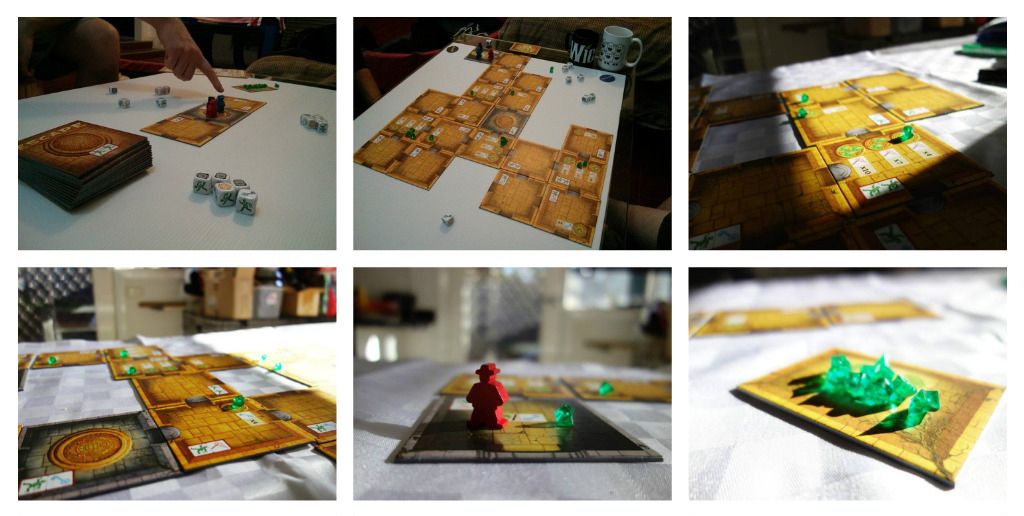
Blurb: In Escape: Zombie City, you and your fellow players are survivors of the zombie apocalypse, hiding in a church of a big city. Everything is going great - well, as great as it can be when zombies are all around - but this is all about to change as a big wave of zombies is coming to town, and they want your brainy goodness. Your only option is to gather all the necessary supplies, start up the old VW Microbus, and get the hell outta Dodge (the city)!
Escape: Zombie City is played with a soundtrack that lasts fifteen minutes. After that length of time, the zombie hordes have gotten too big to defeat, and you have lost your mind, so to speak...
My Thoughts: This is a variant of the first Escape game and I also enjoyed it a lot. Of course Dan didn't like it. Themes are similar to the first Escape although there's a variation in terms of the tasks/collection of items as well as the fact that all the players have to band together at the end to hop on a bus :)
I have to say the dogs don't care what games we play. They just chill out. Here's Ruby the lab visiting us while her mum plays board games with us.
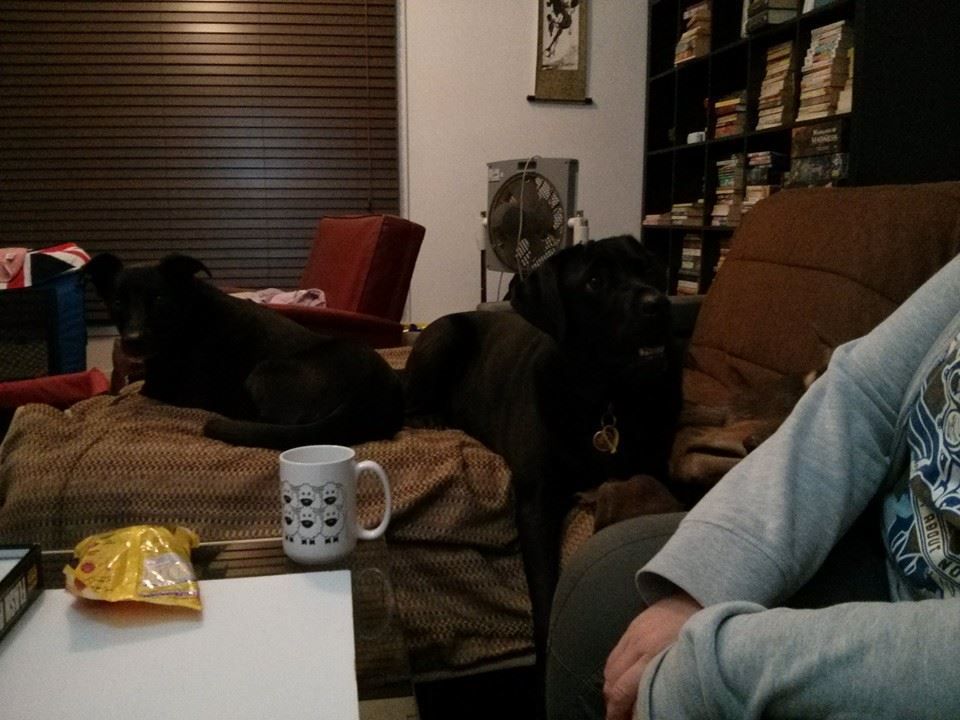

Sometimes friends come to our place to play the games, sometimes we go to our friends' houses. This was when we went to Tony and Chen's and we brought Dodge and our foster dog at the time. We brought a crate so that it wasn't too intrusive :)

The dogs just watched wistfully through the glass
Concept

Blurb: In Concept, your goal is to guess words through the association of icons. A team of two players - neighbors at the table - choose a word or phrase that the other players need to guess. Acting together, this team places pieces judiciously on the available icons on the game board.
To get others to guess "milk", for example, the team might place the question mark icon (which signifies the main concept) on the liquid icon, then cubes of this color on the icons for "food/drink" and "white". For a more complicated concept, such as "Leonardo DiCaprio", the team can use the main concept and its matching cubes to clue players into the hidden phrase being an actor or director, while then using sub-concept icons and their matching cubes to gives clues to particular movies in which DiCaprio starred, such as Titanic or Inception.
The first player to discover the word or phrase receives 2 victory points, the team receives points as well, and the player who ends up with the most points wins.
My Thoughts: It's basically like charades but much more cerebral than that. The interesting thing is that unlike most board games, you don't have hard and fast rules. So long as you don't use words or gestures to help people along, the game pretty much allows you to use the board, graphics and tokens in any way you like to try to help people guess your meaning.
Kill Doctor Lucky

Blurb: In this notorious game, an inversion of Clue, you hate Doctor Lucky. Maybe he left you out of his will. Maybe he killed your pet rock. Whatever the reason, you want him dead. Unfortunately, so do the other players. Since you don't want to go to jail, you need to make your attempt in secret; if anybody can see you, whistle nonchalantly, and let the Doctor live ... until next time.
Players move around the mansion, collecting murder weapons (to make the murder attempt stronger - doubly so if the weapon is used in an appropriate location); failure cards (to thwart opponents' plans); and movement cards (to try to get together with Doctor Lucky in a secluded location for his inevitable demise.) Players try to convince others to use up their failure cards first, the better for when their own attempts come.
My Thoughts: I've never much liked Clue (or Cluedo as it is called sometimes) but I really enjoyed this game. Dr Lucky is ever-out of your reach and players compete against one another to kill Dr Lucky - but you can't do it unless you are alone and no other player can see you (the rooms have doorways). You also need to have enough spite points to kill him. There are a number of different complexities in play and it's competitive but in a fun way.
Escape: The Curse of the Temple

Blurb: Escape: The Curse of the Temple is a cooperative game in which players must escape (yes...) from a temple (yes...) which is cursed (yes...) before the temple collapses and kills one or more explorers, thereby causing everyone to lose.
The initial game board consists of a row of three square tiles, each showing a combination of two symbols, say, two green adventurers or one green adventurer and one blue key in one corner of the tile. All of the explorers start in the center tile - the safe room - and each player starts with a hand of five dice. Each die has five symbols:
A cursed mask - this die is set aside when rolled.
A golden mask - each such symbol counteracts two cursed masks, either your own or those of another explorer in the same room.
A red torch or blue key - these are used to enter rooms, access treasure, or activate gems.
A green adventurer, which appears twice on the die - you need these to move from room to room, and to activate some gems.
Escape is played in real-time, with all players rolling dice and taking actions simultaneously. You must roll the right symbols to enter a room, and if you're at an open doorway, you can roll to reveal the next tile in the stack and add it to that doorway. Some rooms contain combinations of red and blue symbols, and if you (possibly working with other players in the same room) roll enough red or blue symbols, you "discover" magic gems, moving them from a separate gem depot onto that tile.
The real-time aspect is enforced by a soundtrack to be played during the game. At certain points, a countdown starts, and if players aren't back in the safe room when time is up, they lose one of their dice.
Once the exit tile is revealed, players can attempt to escape the temple by moving to that tile, then rolling a number of blue dice equal to the magic gems that haven't been removed from the gem depot. Thus, the more gems you find, the easier it is to escape the temple. When a player escapes, he gives one die to a player of his choice. If all players escape before the third countdown, everyone wins; if not, everyone loses, no matter how many players did escape.
Escape: The Curse of the Temple includes two expansion modules that can be used individually or together. With the "Treasures" module, some rooms contain treasure, and when you reveal such a room, you place a face-down treasure chest on the tile. Roll the symbols on that chest tile, and you claim the treasure for use later: a key lets you teleport anywhere, a path lets you connect two rooms that otherwise have no door between them, and a medic kit heals all players instantly (putting black dice back into play). With the "Curses" module, some tiles "curse" players by forcing them to place one hand on their head, keep mute during play, or otherwise do what you wouldn't want to do while escaping a temple!
My Thoughts: Dan hates this game because he likes turn based strategy games and not games where you are racing against the clock. I think there are so many fun elements to it though.
- I love the pretty gems
- I love the cards and the fact that you unfold the board (and chambers) as the game unfolds
- the time limit is based on the soundtrack and you can download a variant that has the Indian Jones theme in there
- it gets tense and stressful but you work together
Escape: Zombie City

Blurb: In Escape: Zombie City, you and your fellow players are survivors of the zombie apocalypse, hiding in a church of a big city. Everything is going great - well, as great as it can be when zombies are all around - but this is all about to change as a big wave of zombies is coming to town, and they want your brainy goodness. Your only option is to gather all the necessary supplies, start up the old VW Microbus, and get the hell outta Dodge (the city)!
Escape: Zombie City is played with a soundtrack that lasts fifteen minutes. After that length of time, the zombie hordes have gotten too big to defeat, and you have lost your mind, so to speak...
My Thoughts: This is a variant of the first Escape game and I also enjoyed it a lot. Of course Dan didn't like it. Themes are similar to the first Escape although there's a variation in terms of the tasks/collection of items as well as the fact that all the players have to band together at the end to hop on a bus :)
I have to say the dogs don't care what games we play. They just chill out. Here's Ruby the lab visiting us while her mum plays board games with us.


Sometimes friends come to our place to play the games, sometimes we go to our friends' houses. This was when we went to Tony and Chen's and we brought Dodge and our foster dog at the time. We brought a crate so that it wasn't too intrusive :)

The dogs just watched wistfully through the glass